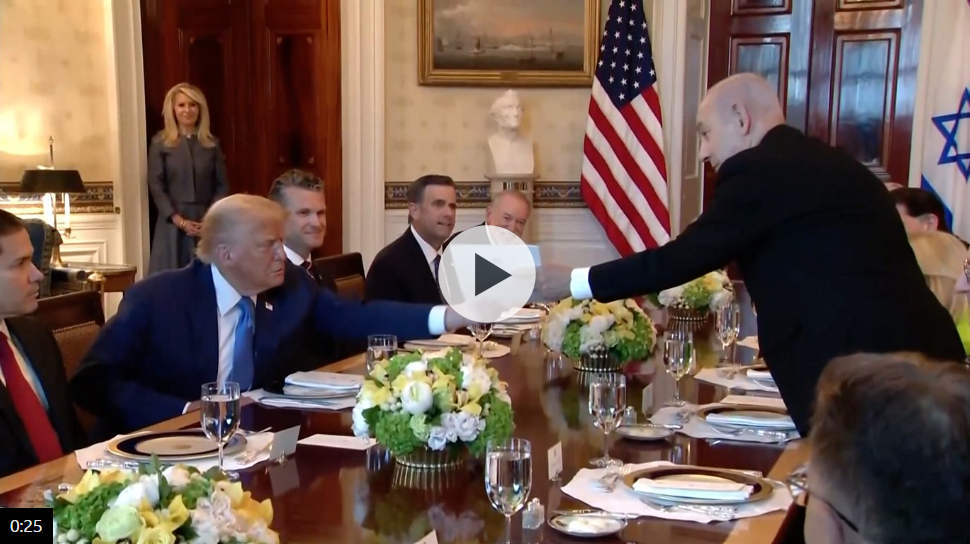

US President Donald Trump has said he thinks talks to end the war in Gaza have been "going along very well", as he hosted Israeli Prime Minister Benjamin Netanyahu in Washington DC.
Trump also expressed confidence that Hamas was willing to end the 21-month conflict. "They want to meet and they want to have that ceasefire," he said in unexpected remarks to reporters at the White House.
The meeting came after the latest rounds of indirect ceasefire talks between Israel and Hamas in Qatar ended without a breakthrough, though negotiations were expected to continue this week.
Both leaders were asked about potential plans to relocate Palestinians, with Trump saying he has co-operation from countries neighbouring Israel.
Netanyahu, meanwhile, said he was working with the US on finding countries that will "give Palestinians a better future".
"If people want to stay, they can stay, but if they want to leave, they should be able to leave," Netanyahu said.
The Palestinian presidency has previously rejected plans to relocate Palestinians, which it pointed out would violate international law.
Netanyahu also appeared to play down prospects of full Palestinian statehood, saying that Israel will "always" keep security control over the Gaza Strip.
"Now, people will say it's not a complete state, it's not a state. We don't care," Netanyahu said.
At the meeting, the Israeli PM also said he had nominated Trump for the Nobel Peace Prize, reportedly a long-held goal of the US president.
"He's forging peace as we speak, in one country, in one region after the other," Netanyahu said as he presented Trump with a letter he sent to the prize committee.
Trump has previously said he would be "very firm" with the Israeli PM about ending the war and indicated that "we'll have a deal" this week.
The White House initially said it would not make the meeting between the two leaders open to media, with officials describing it as a private dinner during which Trump would prioritise the push for an end to the war and the return of all hostages.
Keeping the meeting closed to journalists would have been unusual for a president who likes to platform his positions with foreign leaders in front of the world's press.
The US-backed ceasefire proposal would reportedly see Hamas release 10 living hostages and the bodies of 18 dead hostages in five stages during a 60-day truce.
Israel would be required to release an unknown number of Palestinian prisoners and withdraw from parts of Gaza, where it now controls about two-thirds of the territory.
Obstacles to a deal remain significant.
The main outstanding issue relates to aid, as Hamas insists on ending the work of the Gaza Humanitarian Foundation, while the Israeli delegation refuses to discuss the issue, saying they are not authorised to discuss it.
During his visit, Netanyahu met US Secretary of State Marco Rubio and Trump's Middle East envoy Steve Witkoff.
As Netanyahu's armoured limousine travelled to the White House, dozens of protesters gathered at security gates, waving Palestinian flags and shouting calls for the Israeli's PM's arrest.
Netanyahu, along with his former defence minister Yoav Gallant and a Hamas commander Mohammed Deif, were made subjects of an arrest warrant in November from the International Criminal Court (ICC) for alleged war crimes and crimes against humanity.
Netanyahu has rejected the allegations, calling the warrants antisemitic, while the Trump administration has imposed sanctions on four ICC judges for what it called "baseless actions targeting America or our close ally, Israel".
The latest round of negotiations on the war in Gaza began on Sunday in Doha, with representatives seated in different rooms in the same building.
A second session was held on Monday and ended without a breakthrough, a Palestinian official familiar with the negotiations told AFP.
Witkoff was due to join the talks in Doha later this week in an effort to get a ceasefire over the line as the Gaza conflict nears its 22nd month.
Speaking to the BBC, US Ambassador to Israel Mike Huckabee declined to say whether Trump would give a written guarantee that a proposed 60-day ceasefire would be extended, so long as negotiations continue.
"I simply don't know," Huckabee said.
This is one of Hamas's key demands and a stumbling block in the current negotiations.
When asked whether he believes Trump can achieve a breakthrough with the Israeli leader, Huckabee said: "I'm not a prophet. I cannot predict the future, so I won't try to tell you what will happen."
Netanyahu is visiting the White House for the third time since Trump returned to power nearly six months ago.
But the leaders are meeting for the first time since the US joined Israeli attacks on Iranian nuclear sites and then brokered a ceasefire between Israel and Iran.
There is a strong sense that the recent 12-day war has created more favourable circumstances to end the Gaza war.
Witkoff said at Monday's dinner that a US meeting with Iran would take place in the next week or so. Trump also said he would like to lift sanctions on the Islamic Republic at some point.
The US president has expressed increasing concern over the conflict in Gaza in recent weeks and believes there is a "good chance" of reaching a ceasefire.
White House spokeswoman Karoline Leavitt said it was Trump's "utmost priority" to end the war in Gaza and that he wanted Hamas to agree to the 60-day deal "right now".













